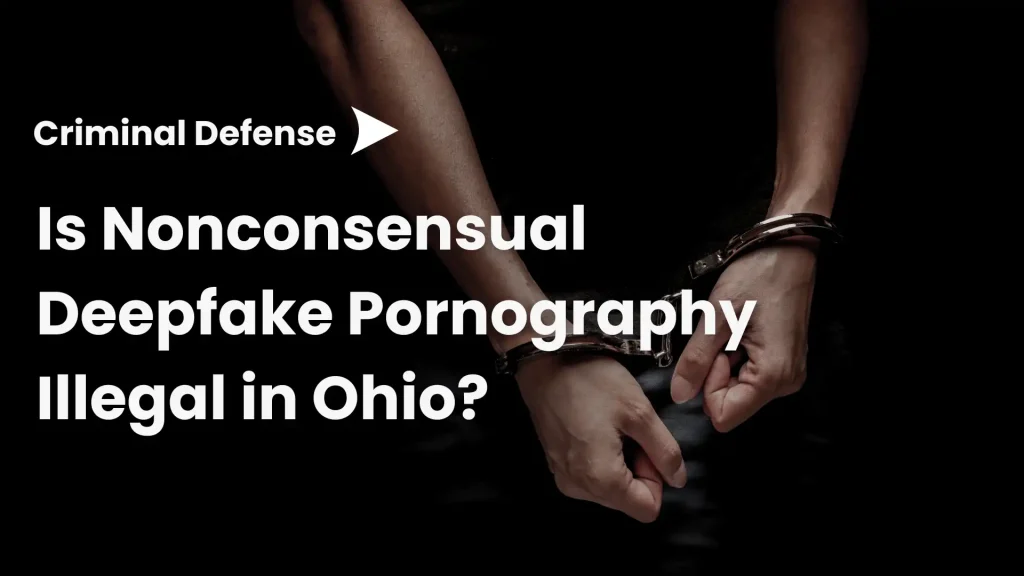Posted on Wednesday, August 7th, 2024 at 7:45 pm
 The rise of artificial intelligence (AI) technology has brought new challenges to the criminal legal landscape. One of the biggest involves digital media manipulation. If you’re facing charges related to nondeepfake pornography in Cincinnati or the surrounding areas, it’s crucial to understand the legal implications and seek experienced legal representation.
The rise of artificial intelligence (AI) technology has brought new challenges to the criminal legal landscape. One of the biggest involves digital media manipulation. If you’re facing charges related to nondeepfake pornography in Cincinnati or the surrounding areas, it’s crucial to understand the legal implications and seek experienced legal representation.
What Is Nonconsensual Deepfake Pornography?
Nonconsensual deepfake pornography involves using AI or other advanced technologies to create or manipulate sexually explicit images or videos of people without their consent. These deepfake videos or images can be incredibly realistic, making it difficult for viewers to distinguish between authentic and fabricated content. The technology allows creators to superimpose someone’s face onto another person’s body in explicit scenarios, resulting in sexual images that could potentially cause severe emotional distress and reputational damage to the victim.
Current Legal Status in Ohio
As of 2024, Ohio does not have specific laws addressing nonconsensual deepfake distribution, although the Ohio House of Representatives is considering new legislation. However, this doesn’t mean that creating or distributing such content is without legal consequences. Prosecutors may pursue charges under existing statutes related to:
- Invasion of privacy
- Harassment
- Stalking
- Revenge porn laws
- Child pornography laws (if the depicted individual is a minor)
The lack of specific legislation targeting deepfakes can make these cases complex. Skilled legal representation can navigate the nuances of existing laws and their application to new technologies.
Potential Charges and Penalties
While Ohio law doesn’t explicitly mention deepfakes, individuals involved in creating or distributing nonconsensual pornographic deepfakes could face various charges:
- Telecommunications Harassment: A Telecommunications Harassment charge may apply if the deepfake is used to knowingly cause another person to believe they will be physically harmed or if it’s used to urge or incite another to commit a crime against the person depicted. Penalties: First-degree misdemeanor, punishable by up to 180 days in jail and fines up to $1,000.
- Menacing by Stalking: A Menacing by Stalking charge may apply if the deepfake is part of a pattern of conduct causing mental distress or fear of physical harm to the victim. Penalties: First-degree misdemeanor or fourth-degree felony if certain factors are present (such as prior convictions or the victim is a minor).
- Unlawful Use of a Telecommunications Device: A charge of Unlawful Use of a Telecommunications Device could apply if the deep fake is disseminated electronically with intent to abuse, threaten, or harass.
- Penalties: It is a felony of the fifth degree, punishable by up to 12 months in prison and a fine of up to $2,500.
- Pandering Obscenity: If the deepfake content meets the legal definition of obscenity. Penalties: Fifth-degree felony for a first offense, punishable by up to 12 months in prison and a maximum $2,500 fine.
- Child Pornography Laws: If the deepfake depicts a minor, even if no actual minor was involved in its creation, charges could include Pandering, Sexually Oriented Matter Involving a Minor.
- Penalties: Second-degree felony, carrying potential prison sentences of 2-8 years and a maximum fine of $15,000.
Defending Against Deepfake Pornography Charges
If you’re facing charges related to nonconsensual deepfake pornography in Cincinnati, it’s essential to secure experienced legal representation immediately. The attorneys at Moermond & Mulligan, LLC understand the complexities of these cases and can provide the robust defense you need. Here are some potential defense strategies:
- Lack of Intent: Proving that you did not intend to harass, threaten, or cause distress to the depicted individual.
- Consent: Demonstrating that you had permission to create or distribute the content. This is rarely applicable in nonconsensual deepfake cases.
- First Amendment Protection: Arguing that the content is protected speech, particularly if it’s clearly labeled as parody or satire.
- Technical Challenges: Questioning the prosecution’s ability to prove the origin and nature of the deepfake content.
- Challenging Identification: Disputing whether the depicted individual is identifiable or whether the content meets the legal definition of the charged offense.
The Future of Deepfake Legislation in Ohio

Buckeye state has no specific laws addressing the issue. Lawmakers have proposed legislation to criminalize the creation or distribution of nonconsensual deep fakes. If enacted, the proposal would make such actions a first-degree misdemeanor on the first offense and a fifth-degree felony for repeated offenses.
Protect Your Rights with Moermond & Mulligan, LLC
Facing charges related to nonconsensual deepfake pornography in Ohio? You need an experienced Cincinnati sex crimes defense lawyer who understands both the legal and technical complexities of these cases. Call Moermond & Mulligan, LLC at (513) 421-9790 to schedule a confidential consultation with one of our attorneys. We have over five decades of combined experience and a proven track record in criminal defense. Let us provide the strong representation you need. Don’t leave your future to chance—contact us today.
Related Posts:
What Is the Ohio Law on Recording Conversations in a Legal Case?
Written By: Moermond & Mulligan, LLC
Last Updated: 02-11-2025